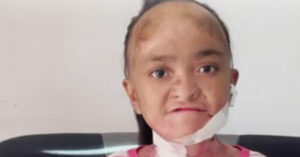Minutes after her emergency C-section when Jennie Wilklow gave birth to her daughter, Anna, the newborn’s skin started to thicken and crack, creating fissures throughout her small body.
“Things were all seemingly perfect. Moments after her skin hit the air it began to harden and then split causing open wounds all over her body,” Wilklow, 34, tells PEOPLE of her daughter’s birth in September 2017. “For months her skin had been building up but now out of the womb it became dry and hard, like armor.”
Wilklow recalls the shock among nurses at the hospital as Anna’s eyes swelled and her hands and feet were cut off from circulation.
“The doctors and nurses were visibly shaken,” Wilklow, 34, recalls, “and my husband sat silently in the post-op room.”
Anna was born with harlequin ichthyosis, a rare condition that causes newborns to form thick plates of skin that split and crack around their body.
This skin hardening can dramatically influence the appearance of an infant and cause their lips and eyelids to turn inside out, or generate constriction around their chest that makes breathing and eating hard.
In the past, infants born with harlequin ichthyosis typically survive only a few days after birth, but thanks to medical advancements, many have been able to live into their teenage years or into their twenties with normal mental and intellectual development.
Still, some newborns with harlequin ichthyosis won’t survive if their condition is too severe.
Treatment for the disease is extremely intensive and involves a thorough skin care regimen that aims to keep the skin moisturized and soft to prevent infections.
“I decided to stop work and stay home with her full time to give her everything she needs and I couldn’t be happier with my decision,” says Wilklow, from Highland, New York. “She has a lot of challenges, but she never complains so neither do I.”
Lil’ Anna consumes a tremendous 2,100 calories a day because her body generates so much additional skin.
“We have to adjust to the heat, the cold, and her skin,” Wilklow explains. “[We have] her multiple two-hour baths a day and daily caloric needs, and we have weekly occupational therapy and bi-weekly physical therapy.”
The family is also involved on social media, and Wilklow often posts on their Instagram and Facebook pages to increase awareness of the disease.
“Anna’s personality is always happy and incredibly loving,” Wilklow says of her daughter. “She steals people’s hearts because even when she is dry and uncomfortable, she’s always smiling.”
“I have learned everything from Anna,” she adds. “To trust myself, to be kind to myself, to wake up every day and try harder than the day before.”
Wilklow hopes that Anna’s story inspires people to focus on the good, even when things seem darkest.
“You can choose happiness. It’s really not about what happens in your life, but instead how you choose to move forward,” she says. “Every morning I wake up and look over at the biggest smile and all I can feel is lucky.”













